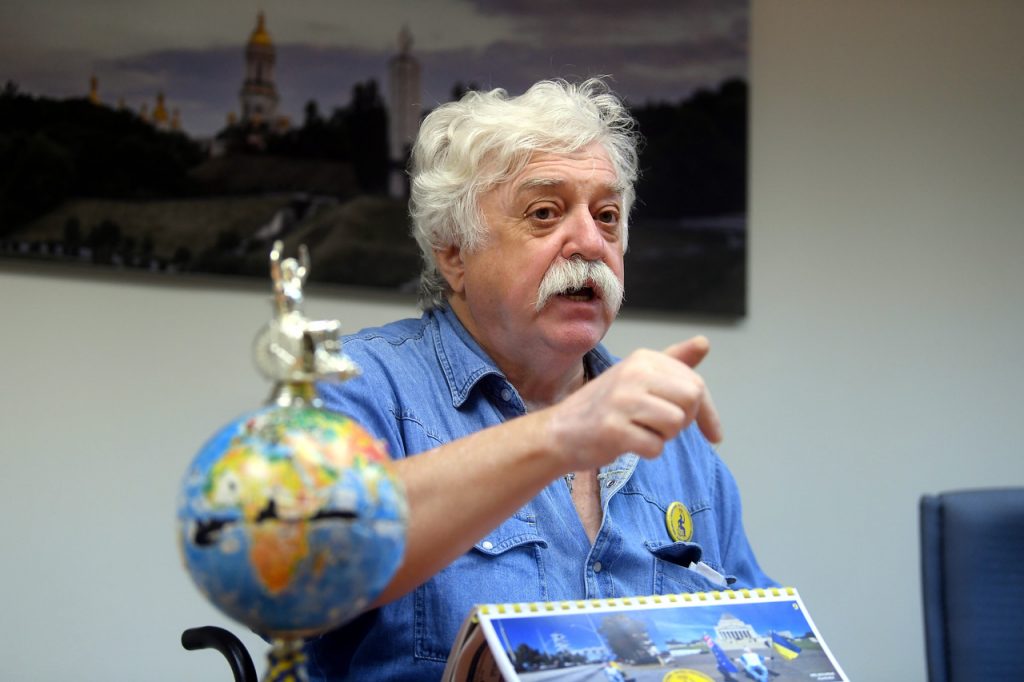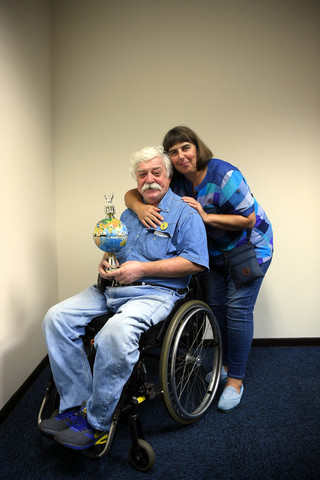By Tengku Faezah Tengku Yusof

Mykola Podrezan is 66 year old engineer from Ukraine is a paraplegic but that has not stopped him from doing what he is passionate about travelling. The first leg of his travel “marathon” saw him visiting 35 cities in 27 countries in six continents and he is currently touring Southeast Asia as part of the second leg of his world tour. Photo courtesy Bernama
KUALA LUMPUR, (NNN-BERNAMA FEATURE) — The saying, “Where there is a will, there is way,” fits Mykola Podrezan to a T. The 66-year-old engineer from Ukraine is a paraplegic but that has not stopped him from doing what he is passionate about – travelling.
The first leg of his travel “marathon” saw him visiting 35 cities in 27 countries in six continents and he is currently touring Southeast Asia as part of the second leg of his world tour.
“My tours are part of a project that I have named ‘Planet Earth, as viewed from a wheelchair’. It has not been easy for me (to be a wheelchair-bound traveller). In fact, I didn’t think it would be so difficult (when I first set out),” he told Bernama, when met at the Ukrainian embassy here early last month.
Podrezan was in Malaysia from Jan 22 to Feb 4 as part of his Southeast Asian tour.
Podrezan’s overseas trips were mostly self-sponsored and his wife Nataliya Griaznova, 53, a physical medicine and rehabilitation physician, accompanies him whenever he travels.
SEVEN YEARS

Mykola Podrezan from Ukraine is a paraplegic but that has not stopped him from doing what he is passionate about travelling.
The first leg of his travel “marathon” saw him visiting 35 cities in 27 countries in six continents and he is currently touring Southeast Asia as part of the second leg of his world tour.
Photo courtesy Bernama
A serious road accident in November 1991 robbed Podrezan of his ability to walk after he became paralysed from the waist downwards.
Not wanting his disability to stop him from doing the things he enjoyed, such as travelling around the world, he embarked on his first “marathon” tour from his hometown Kiev – the capital of Ukraine – in September 2011.
Following the route of the 2004 Summer Olympics Torch Relay as a guideline, his trips to 35 cities in 27 countries were completed over a seven-year period in July 2018.
(The torch relay for the Athens, Greece, 2004 Olympics was the first one to be held worldwide.)
Incidentally, when Podrezan was in Switzerland in November 2017, he had the chance to meet International Olympic Committee president Thomas Balch at the IOC headquarters in Lausanne and the latter had described Podrezan’s project as “unique”.
His travels around the world have left him with unforgettable memories. Recalling his visit to the Taj Mahal in Agra, India, Podrezan said the monument of love – one of the seven wonders of the world – was among the places he had dreamed of visiting.
However, it turned out to be a case of being so near, yet so far for him; he could not gain access into the Taj Mahal as it was not disabled-friendly.
“For me, it was a big disappointment. I travelled thousands of miles to get there, but I wasn’t able to go inside,” he said.
FACILITIES FOR THE DISABLED
Podrezan, who was Ukraine’s tourism personality of 2003, received the unstinted support of the Ukrainian diplomatic community and that of Minister of Foreign Affairs Pavlo Klimkin during his travels.
He received the support of the respective Ukrainian embassy in the countries he travelled to, which made it easier for him to move from one place to another.
Podrezan said he also made it a point to study the public facilities provided for the disabled community in the countries he visited.
“I learned how cultural and historical monuments are adjusted for disabled people in cities like Copenhagen (Denmark), Florence (Italy), Seoul (South Korea) and London (United Kingdom),” he said.
He also observed and learned the technologies and concepts used in other countries to accommodate the disabled with a view to introducing them in Kiev, particularly at the historical sites that attract tourists.
“During the Soviet Union’s occupation (of Ukraine), infrastructure for people with disabilities didn’t exist at all. All we had were special homes for the disabled, who were also offered a pension. So Ukraine had to start from scratch (where public facilities for the disabled were concerned).
“And I would say it still has a long way to go. However, what makes me optimistic is that the dynamic that we share is quite good and in terms of transformation, not only are there changes in the physical infrastructure but also in the mentality of the people,” he said.
Podrezan, who is also the member correspondent of the Ukrainian Academy of Construction, said with his participation the authorities in Kiev have built disabled-friendly facilities at major venues such as the National Ukrainian Drama Theatre, National Palace of Arts and Academic Theatre.
A MOVIE BASED ON HIS LIFE
Podrezan’s zeal for living and his extraordinary life despite his physical disability have inspired Ukrainian filmmaker Serhiy Krutsenko, who is also a composer and musician, to direct a local movie based on Podrezan.
Initially, Krutsenko wanted to make an hour-long film titled ‘Stronger than Angel’ but now the producers are upgrading the script and making it into a full-scale movie.
“It is currently being edited and given the final touches in the United States. We are hoping it can be screened (in Ukraine) this summer,” said Podrezan, adding that the movie was a motion picture and not a documentary.
“It features many real-life stories, both of me and other wheelchair-bound people,” he added.
Commenting on his visit to Malaysia, Podrezan said he did not know much about Malaysia before he came here.
“I only discovered Malaysia when I came here. What captured my interest is the ethnic and cultural diversity. In one spot you can find a mosque, next to it a church, Buddhist and Hindu temples. So it is mutual respect for each other’s race and religion that matters most,” he said.
On accessibility for the disabled in Malaysia, Podrezan said overall, there was room for improvement. However, he was impressed with the facilities at the Kota Bharu airport in Kelantan but felt that the services for disabled travellers at the Kuala Lumpur International Airport could be improved.
